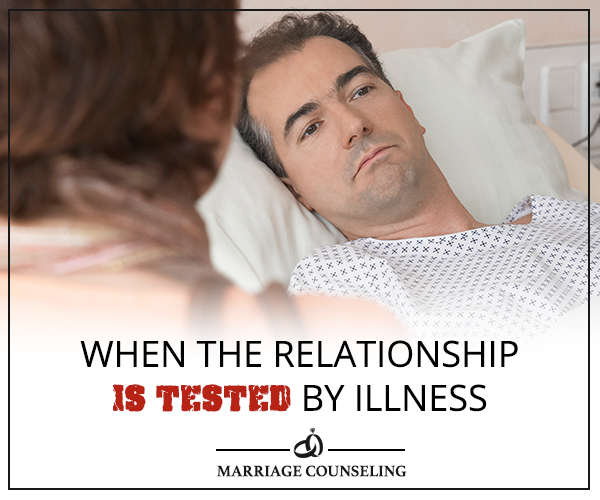
When you and your partner start out you never think, plan or dream that you could have something as drastic as a chronic illness that might test your commitment and your resolve to make your relationship work. There are a lot of great words we tell each other like, “for better and for worse, in sickness and in health, I’ll love you forever”. We start out with all the best intentions, but what really happens when your resolve is put to the test?
When it happens it’s like a bolt out of the blue; a symptom, a diagnosis a prognosis. If it’s your diagnosis, you have to come to grips with the fact that your body is betraying you, that you have a fight on your hands. A chronic illness is not like an injury or a broken bone, where you need some short term care and support and maybe crutches or a cane, then you’re able to resume your normal activities .It’s absolutely reasonable for you to expect your partner to help you and support you through an issue like that, but what if you’re going to be ill for years or potentially for the rest of your life? What does that mean to the quality and the nature of the relationship between you and your partner? When you can no longer be a physical match for your partner and you become so ill that you need caretaking, do you want your spouse to fill that role, and for your status to change from that of a loving partner, to a patient who might be fully dependent upon others for everything?
You can choose to fight or to give up on life and your relationship with your partner but a diagnosis of chronic illness doesn’t necessarily mean life is over. Some people live years and even a normal lifespan with a chronic illness. Life will change and so will you, without a doubt, the question is about how you and your partner will handle those changes. Can you stay close, connected and unified in your love for each other?
When someone experiences a dramatic and rapid decline, the relationship between the two of you may be the only thing that sustains you through that time of turmoil.
Diseases like cancer throw you. You can have treatment and remission then it can come back. It feels like a never ending cycle of pain and treatment. Illness can consume your entire life, and will stress all of your available time and resources.
Other forms are diagnosed with a poor prognosis or discovered in an advanced stage, the end is nearer that you want to believe. When that happens there are arrangements that need to be made, you need to get your house in order and make provisions for your family and kids if you have them, all the while trying to cope with your declining health.
This is a time that you need support from your family your circle, your tribe and most of all, your partner. Getting all the information, making arrangements, medical treatments and appointments organized can be a full time job so what happens to housework, kids’ activities, pets and all the other responsibilities of running a household if you’re no longer able to manage it due to chronic illness? Enlist the help of your friends and family to assist you, do what you can, but be willing to give up control to others so that you can concentrate on dealing with your chronic illness and working to find the best balance between taking care of yourself and making sure that everything else that’s important gets handled as well.
Should you put on a brave face to make others feel better? People with chronic illness do it all the time. Your partner is that one person in the world that you should be able to show the real you to; even the pain and ugliness of chronic illness. Resist the temptation to try to be strong for your partner. They are in this with you all the way. They are the one person that knows you and loves you for who you are and should be willing to stand w/ you, sit with you and support you in whatever you need.
From the spouse/partner point of view it’s a whole other set of stresses and worries. Worry for the current situation, for the future, and a whole lot of pressure. Financial stress stemming from running the household and helping the partner with the chronic illness to function and feel better.
If you’re the partner in this scenario you might be thinking, “This is not what I signed up for, or is it?”
60 minutes just ran a series of interviews with a couple where the wife suffers from dementia. She became ill at age 65 and her husband took care of her, dealing with her illness and decline. CBS interviewed the couple over the 14 years of her illness while her husband was her caregiver. It was a heartbreaking portrait of true love. The husband, Mike, had tears in his eyes when telling about how he thought he could handle caring for her at home, but he had given up and had to bring in full time caregivers and then finally send her to a facility where she could be properly cared for.
The interviewer asked him did he still love his wife. He replied that he loved her, when she WAS her, but that now she, the woman he loved was gone. He had been so devoted to her to the point that it gave him depression, anxiety and high blood pressure due to all the worry.
I knew a couple that were married for over 30 years, they had 5 daughters and a beautiful home. They had run a business together for most of their married life. When their youngest daughter was in her twenties, the wife was diagnosed with breast cancer. She began treatment, had surgery and was undergoing chemotherapy when her husband left. I was so surprised given how long they’d been together and how loving their relationship was. Turned out that he loved her so much he couldn’t bear to see her ill or to witness her declining health. It caused a great deal of strife in the family because he, in effect, abandoned her; but after he told me why, it made more sense. He just couldn’t handle it.
When you’re the primary caregiver for someone with a chronic illness, you have to be aware that you can suffer from your own issues related to the stress and pressure that you’re taking on.
Caregiver burn-out is a real thing, and you must make sure that you give yourself a break, practice self-care and know the warning signs. Fatigue, insomnia, high blood pressure, gastric issues…What good will you be to your partner and family if you allow yourself to become ill? None.
You may not have the capacity to care for your loved one at home, so then you have to entrust their care to professionals at a medical facility. This doesn’t mean you’ve failed, it simply means that you are getting your partner the help that you cannot give and there’s no shame in that.
It’s important that you and your partner talk about these issues and the possibilities of a chronic illness happening in the future. You should both have a will and an estate plan, as well as having conversations around end of life decisions, power of attorney and those types of issues. Don’t wait until you’re in a crisis to have these discussions.
Meanwhile, enjoy the good days, and be as loving and supportive to your partner with a chronic illness as you would want them to be for you.
Subscribe to My YouTube Channel
Ask Me a Question
If you have a question, comment, thought, or concern, feel free to comment below. We’d love to hear from you!

